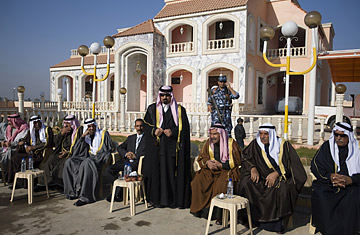
Sheik Mohammed al-Hais, standing, with tribal sheiks at his family compound.
It's a scene rarely witnessed by foreign eyes: a meeting of the great sheiks of Iraq's Anbar province, at the heavily guarded compound of the powerful chieftains of the al-Hais family, on the outskirts of the provincial capital. Some 300 tribal elders have gathered here, most of them in traditional garb, and much of the morning has been taken up with the elaborate Arab rituals of salutation. Every newcomer must greet every person already present with handshakes, hugs and kisses — on the cheek to show friendship, on the shoulder for respect. Then there are the endless cups of tea and coffee. The early arrivals bask patiently in the November sun as they wait for the laggards.
To make the wait more bearable, the hosts, Sheik Mohammed al-Hais and his brother Hamid, have laid on some traditional entertainment. A small group of line dancers (all men, naturally) sing paeans to the might and valor of the tribes of Anbar. "Throw us on the enemy, and watch them flee," they chant, to the accompaniment of drums. In centuries past, this is how tribal armies psyched themselves up for battle. (See pictures of Anbar sheiks coming together.)
And indeed, the sheiks are preparing for hostilities — of the democratic kind. With Iraq-wide provincial elections two months away, these Anbari chieftains have banded together under the banner of the Iraqi Tribal Front, and will field candidates in several provinces. So after the compound has filled up, the chanting turns distinctly political. "We are with Nouri al-Maliki on SOFA," they shout, referring to the status of forces agreement that the Iraqi Prime Minister has signed, amid considerable domestic opposition, with the U.S.
Opponents of the SOFA want the U.S. military to leave Iraq sooner than the 2012 deadline that al-Maliki is pushing for. But many of the sheiks are leaders of the Awakening Councils, the U.S.-funded paramilitaries that helped drive al-Qaeda out of Anbar. They — and thousands of their men — receive salaries from the U.S. military, and they don't want their paymasters to leave any sooner than absolutely necessary.
There's another political motivation behind their support of al-Maliki and the SOFA. The agreement is opposed by the Iraqi Islamic Party (IIP), the Sunni party loathed by the sheiks. The IIP won control of the Anbar provincial government in the last election, when most of the sheiks boycotted the vote. Now the chieftains want to supplant the IIP as the main voice of Iraq's Sunnis. Backing the SOFA and al-Maliki allows them to distinguish themselves from the IIP. The sheiks, in short, are playing democratic politics.
At the al-Hais compound, the dancers withdraw, and it's time for the main event. A portable dais is hauled into a corner of the quadrangle, and a series of sheiks troop up to it and make brief speeches. Their political inexperience is revealed by their language, which is absurdly over the top. Opponents of the SOFA are denounced as "enemies of Iraq" and "antinationals." There are ad hominem attacks on some of the politicians opposed to the agreement. The IIP is not mentioned by name, but nobody here is in any doubt that most of the vitriol is aimed at it. Some of the speakers come out of left field, attacking Kurdish political parties that actually do support the SOFA.
The speeches have one redeeming quality: they're short. After the al-Hais brothers have spoken, all that's required of the other speakers is to agree as quickly as possible. Then it's back to the singing and dancing, and now some of the sheiks are coaxed to join in. A poet, clad incongruously in leather jacket and trousers, loudly declaims the virtues of patriotism and warns against those who would seek to hurt Iraq. Again, there are knowing smirks all around: he's talking, of course, about the IIP.
The sheiks have been waiting for several hours now, and it's time for lunch. A row of aluminum tables is placed in the quadrangle, and giant trays of rice and lamb appear. The sheiks stand around as they eat directly from the trays. Everybody seems to agree that it has been a most productive morning, and as they depart, the sheiks make sure to compliment the al-Hais chieftains, Mohammed and Hamid, who beam with satisfaction. "This is politics, Anbar style," says Hamid. And what does he think of the election? "The only way anybody else can win is if they steal it, and if they try, we know how to deal with that too."
Messing with the al-Hais brothers is not a good idea. Local lore has it that when al-Qaeda kidnapped Sheik Mohammed a couple of years ago, it demanded $120,000 for his release and added one other demand: that his home, the centerpiece of the al-Hais compound, be leveled. The family complied. But as soon as he was free, Sheik Mohammed ordered the house to be rebuilt exactly as before. To underscore his defiance, he named the new building al-Tahadi, or the Challenge.
The sheiks of Anbar have issued a challenge of their own. Iraqi politics will never be the same.
